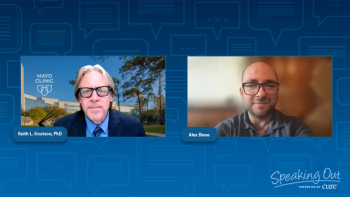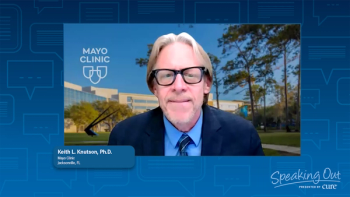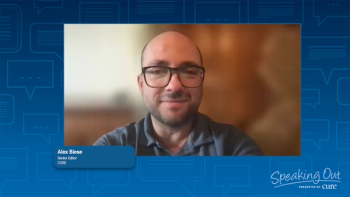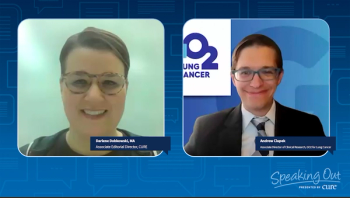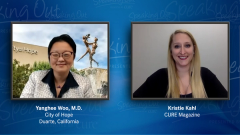
Disparities in Gastric Cancer
Yanghee Woo, M.D., comments on disparities in healthcare for select patients with gastric cancer and describes how these impact the diagnosis and treatment of the disease.
Kristie Kahl: Hi, my name is Kristie Kahl. [I’m] Vice President of Content at MJH Life Sciences, the parent company of CURE magazine. In this edition of the Speaking Out video series, on behalf of Hope for Stomach Cancer, we're speaking with Dr. Yanghee Woo from City of Hope about disparities in gastric cancer. Hi, and welcome.
Yanghee Woo, M.D.: Hi, Kristie. I'd like to thank your magazine and Hope for Stomach Cancer for hosting me on the CURE Speaking Outvideo series on stomach cancer, AKA gastric cancer. It's my pleasure to be here, to speak with you on this dear topic.
Kristie Kahl: Thanks. To start, can you discuss the disparities that we're seeing in gastric cancer? In particular, are there risk factors in these patient populations?
Yanghee Woo, M.D.: There are absolutely disparities in gastric cancer. I think that the disparities in gastric cancer are very, very distinct and noticeable, and Southern California, where City of Hope is, is sort of the Mecca of gastric cancer. Because gastric cancer disparities are actually distinct to ethnic minorities, we witness them here a lot. There are ethnic and socioeconomic disparities seen in gastric cancer. For example, incidents of gastric cancer are 1.8 times higher in the general, non-Hispanic white population compared to the ethnic minorities, with a huge difference among Korean Americans who live in Southern California. For example, Korean American men and women are 12 to 14 times more likely to be diagnosed with gastric cancer than their friends who are non-Koreans. There is a huge disparity in the disproportionately adverse impact of gastric cancer on ethnic minorities. Well, what are some of these risk factors that make them this way? At-risk ethnic groups seem to have a higher incidence of H-pylori infection rates, and a long duration of untreated H-pylori increases the risk of developing gastric cancer. The other rates that are notable are that smoking rates are higher in some of these ethnic groups, [as well as] diets high in salt and charred foods. In addition, they're more likely to develop these pre-malignant transformations of the stomach wall called gastric intestinal metaplasia that can eventually develop into gastric cancer. Just to give you an example of the difference, there is a 9% to 14% incidence rate of having these pre-malignant metaplasias in the stomach if you are a non-Hispanic white. If you're Hispanic, that rate goes up to 34%. If you're Chinese, it's 26%, and if you're Korean American, that's 40%. These risks are very much associated with disparities among the ethnic groups and even among the sub-Asian ethnic groups.
Kristie Kahl: How are these disparities causing delays in diagnosis or leading to advanced-stage disease?
Yanghee Woo, M.D.: That's a great question. The gold standard for prevention of gastric cancer and early diagnosis is an effective screening program in a high-risk population. In high-incidence countries, such as South Korea and Japan, national cancer screening guidelines include upper endoscopy like they have for breast cancer, and like we have for breast cancer and colonoscopies for colon cancer. In high-incidence countries, they have upper endoscopy as a screening mechanism at the age of 40. This has been shown in high-incidence countries to improve early detection and be effective at preventing gastric cancer. In the United States, we are challenged by the fact that gastric cancer is not a high-incidence cancer overall. Even though we have an overall low risk of gastric cancer in the United States, there are certain specific ethnic minorities that have higher incidence. We currently do not have a structured national screening program that is targeted to identify early gastric cancer in these patients. Therefore, there is usually a diagnosis in an earlier and a later stage of disease. Ethnic populations are disproportionately adversely impacted just because they're at a higher risk.
Kristie Kahl: Similarly, how do [these disparities] affect patients receiving treatment or having access to it?
Yanghee Woo, M.D.: That's sort of a difficult question to answer, but I think ultimately what happens is when patients present with these symptoms that are associated with gastric cancer, like when the young present, it is not the first diagnosis that the physicians think of in these populations. The first thing that comes to mind when you present with a GI symptom is maybe a reflux disease, or they recommend colonoscopies over H. pylori testing. There is a delay in the diagnosis, and then the treatment and access to it is delayed because the diagnosis is delayed. Additionally, the treatment of gastric cancer usually is best done in a multidisciplinary team setting because of the low incidence of this disease. There are not as many high-volume centers and experts who treat this disease around the country.
Kristie Kahl: How can we address some of these disparities?
Yanghee Woo, M.D.: I think we can address the disparities in two [ways]. One is if [we] want to eliminate the healthcare disparities and stop unnecessary deaths due to gastric cancer, we need to have both a comprehensive national prevention and [an] early detection strategy for the high-risk population, and we need clinical trial results that accurately represent the potential differences in tumor biology and response to therapy among the different ethnic populations. Both of these we do not currently have in the United States. Because we have such a diverse gastric cancer ethnic population, it is worth addressing these disparities within the context of prevention and treatment. For several decades, there have been many efforts to address the high-risk populations; isolated efforts around the country, including educational sessions given by the Korean American Medical Association, the American Cancer Society, Asian-American Stomach Cancer Taskforce, et cetera. The good news is that just before COVID-19 shut down our academic travel, there was an international summit of stomach cancer experts at Stanford University attended by many experts from the US, Korea, and Japan. Here we discussed and developed the plan to address the issues of early detection and prevention based on strong scientific evidence. You will soon see some publications that are coming out from the summit, [including] a white paper, [written] by experts that attended the summit, led by Dr. Joo Ha Hwang from Stanford, attended by myself and some other experts from Harvard, Duke, NIH, and Aki Smith from Hope for Stomach Cancer. All [of these are] efforts to urge the development of national guidelines for these high-risk patients to decrease the disparities that occur.
Kristie Kahl: Are there resources for patients facing these disparities in access?
Yanghee Woo, M.D.: Yes, I think the educational material specifically addresses some of these disparities. There are a few. There aren't that many, but this is an area of unmet healthcare need in the United States. Some of the language-appropriate information about gastric cancer can be found by the American Cancer Society or the ethnic-specific community-based organizations like CARE that provide language-specific information tools. What is really missing is even in clinical trials that are testing for gastric cancer or novel therapies, concerted efforts are necessary to provide multilanguage consent forms; information materials about gastric cancer; nutritional forms and language; [and] educational materials, spoken and written. These are not that readily available at most doctors or institutions. I think it is necessary to improve and eliminate disparities in care and gastric cancer.
Kristie Kahl: What is your biggest piece of advice for patients who may be facing some of these disparities?
Yanghee Woo, M.D.: I have so much advice, but first: Know your risk for gastric cancer, and that you are not alone. You should seek a comprehensive cancer care [center] and find a multidisciplinary care team of experts to treat you. You can expect and you should get a culturally appropriate care for your gastric cancer. For example, [you can get] guidance on how to eat after a gastrectomy that is culturally and diet-specific to you, and treatments that may affect you differently. At City of Hope, we speak the language of gastric cancer, and we have a multidisciplinary team of experts ready to treat you in your language within your cultural expectations. That's something that I think patients should be able to expect from any multidisciplinary cancer care team.
Kristie Kahl: Thank you so much.
Yanghee Woo, M.D.: Thank you.
Transcript edited for clarity.


